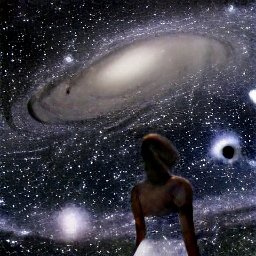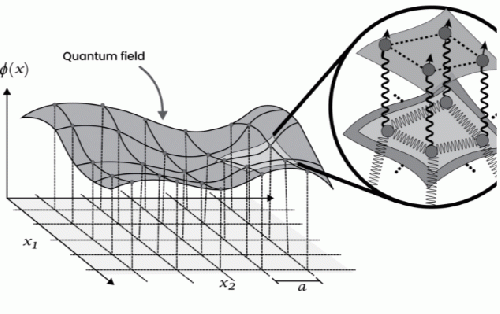In Search of the Blackface Cosmological Constant Inside
by John Kendall Hawkins
Recently, I reviewed The Jazz of Physics, Stephon Alexander's book on cosmology and astrophysics. I loved it. It was mainly memoir and took us through Alexander's journey from growing up a Trinidadian's immigrant's child in the Bronx and discovering a love for physics in a classroom with a white Jewish teacher who played (like Alexander) sax and loved John Coltrane and saw in the kid's eyes genius and wound up potential energy for the task ahead of exploring the uncharted depths of space-time and the human purpose in it. It was a nicely paced book, full of introductions to Nobel-quality minds he meets and works with in his physics journey, as well as a confrontation of the obstacles that got in his way, including bigotry. And what a welcome new way he offers up to approach some of the greats in jazz -- including Coltrane, Ornette Coleman, and Sun Ra -- detailing the parallels of jazz improvisation and scientific intuition. Great stuff.
Stephon Alexander's most recent book is Fear of a Black Universe: An Outsider's Guide to the Future of Physics (2021). It's a good follow-on to Jazz. As the title implies, he sees himself as an outlier, during his second stint as a postdoc researcher, and even after he's established himself in the field and is a professor of theoretical physics at Brown University. Being Black in a white man's universe is a leitmotif that plays with a mute throughout the Jazz, and becomes the tension built into the title of Fear of a Black Universe.
And while race still plays a part in how others at work see him (we are reminded that there were only two Black physics doctoral students in America), he is an outsider this time because of his thinking outside the box. "Why is there something rather than nothing?" was the question that woke him from his slumber. And he finds that much mainstream calculating in physics is too rigid to ever surprise. Most of the best work in pursuit of an understanding of the universe has come with the assistance of dreams, intuitions, analogies, and gedankenexperiments. And Jazz.
While Fear of a Black Universe is a short book (15 chapters, 205 pages), and nominally divided into two parts, conceptually I saw three parts: an introductory section that reiterates much of what Alexander has told us in Jazz; a middle section that critiques standard evaluations and approaches in the field and defends his novel way of thinking against the grain; and, an exposition of the concepts he loves to play with -- the stuff he believes makes his work unique.
In the first section we get a precis of "where we're at in the field," followed by "what the hold-ups are" in advancing the physics further and ways to address it, followed by splashy notions in cosmology and a pleasantly shocking ending that moves the reader toward the interpenetrability of all things. It is dense at times, as there aren't as many analogies and very little jazz allusions, and it is not for the faint-minded, but always fascinating, as Spock would say. (I'd do a mind-meld with Alexander, knowing I'd come out hipper for the experience about a lot of things.) When Alexander gets heavy with the quantum, he uses illustrations to demo his point:
I look at this and see a box-spring as envisioned by a pimp with art skills. You're terrified to know what warped space-time.
There's no easy way to learn cosmology; you have to want to understand what Alexander's on about. He opens the book with, "We physicists have determined that over 95 percent of the matter and energy in the universe is invisible." This translates for the non-physicist to: 95% of the universe is unknown to us. E=mc2 sounds cute, but it ain't. The only ones with a clue are the mathematicians, because that's essentially how the physicists approach that 95%. It's daunting ignorance for the layperson, especially in an age when trust in anything is at a premium.
And Alexander's opening salvo immediately recalls an interview I did recently with neuroscientist Jon Lieff who said of our knowledge of the brain (which I naively believed we were getting somewhere with): "[T]he Genome Project found that less than 2% of our DNA were genes, so called genes -- we don't even know what a gene is really." I was gobsmacked. And here we are screwing around with cool AIs who beat us at chess like we're chutzpah chimpanzees from a slippery banana republic.
In the first chapter, "Escape from the Jungle of No Imagination," Alexander states, "Dark energy resides in all empty space, not just outer space, and permeates all existence." Then he spends considerable time telling us that "we" don't what it is, but it's everywhere, and it's the real star of the universe, not light and matter. He chides those colleagues too afraid to face the monster under the bed, and asks rhetorically, "Do we dread the dark so much that we project our fears onto the very phenomena about which we are scientifically ignorant?"And adds, "Does the scientific community fear embracing 'dark' ideas from outsiders, especially if the ideas may not be in a form that the community is comfortable with, if they do not fit seamlessly into our theories and expected practices?" This comes at one as both a scientific and sociological question. One cringes. We immediately see its relation to the title.
He adds, "The time has come for a new Newton, to reunite the physics of the extraterrestrial with the physics of the terrestrial." And I'm thinking of a book I reviewed a couple years back about Daniel Defoe that included a reference to his contemporary Newton, who was then the Exchequer, who chopped off the heads of coin of the realm forgers, leaving me seeing heads falling in his famous experiment instead of apples. And Newton hated Leibniz and wanted to punch him in the face. Now I don't give a fig about Newton.
The big change in cosmology comes when 'whitey' freed himself from slavish thinking and learned to embrace 'darkie.' Alexander explains:
At the turn of the last century, the discovery of black-body radiation found in most objects that appeared to not emit light was a theoretical "catastrophe" for classical physics, giving nonsensical predictions that are not seen in experiments. But when German physicist Max Planck embraced the reality of the black body, he turned electromagnetic theory on its head, and the quantum revolution was born. Is it possible that the theoretical anomalies we now confront will yield a comparable scientific revolution? If so, who is likely to motivate it?
Discovering "black-body radiation" was like when Southerners discovered Black people were radiant human beings -- a catastrophe for capitalism! In the 60s, we got hip and most of us owned a black light. With a black light, you can't see whitey in the dark until she smiles.
Section one gets our head around the Quantum, as much as that's possible when the reader's high. Although the bubbling and theorizing seem related, especially when the talk circles around multiverses and you go all Timothy Leary, like that Moody Blues song where "he's outside looking in." It doesn't seem like it, I know, but it all ends up being related to what Alexander's talking about in this book. Inside looking out : Outside looking in. Like that Lennon song, "Everybody's Got Something to Hide (Except for Me and My Monkey)." Alexander gets us through the Helter Skelter amusement park ride of potential energetics (think jitters) with aplomb rather than Newton's apple.
I pause and observe that the Unstable looks an awful lot like a wedding ring. Observers, right?
The first part of Fear of a Black Universe is, as I indicated, reiterative. Chapter headings have quips that mess with our minds, like Richard Feyman saying, "If you think you understand quantum mechanics, you don't understand quantum mechanics." We read again about superpositions and emergence and changeless change and the lectures of Chris Isham, Quantum Cosmology professor at Imperial College in London. And once again Isham is telling Grasshopper to look within his dreams and in the work of CG Jung for clues as he navigates his way through the universal labyrinth. He has weekly discussions with Isham and comes around seeing from his mentor's point of view:
One of those was the problem of time in quantum gravity. While our physical (and psychological) experience of the flow of time is taken as fact, time disappears in the equations of quantum gravity. Isham worked on this problem and was a proponent of a new notion of time called internal time. It was no surprise to me to learn that these ideas were inspired by his exploration of psychology and mysticism.
Interesting. And still relevant. Just the other day I was perusing an article that poses the premise: "The Afterlife Is In Our Heads." An epiphenomenon, in the parlance of our day. But, no matter how you come down in the battle over dualism, it gets us to phenomenology, which is fine with Alexander.
One of my favorite discussions in the book is the role of Eastern religions in the development of theories. Alexander raises from the dead Niels Bohr, who, in 1922, won the Nobel Prize in Physics for his work with atomic structure and for developing the first quantum theory. We're told Taoism led to his genius notion of "complementarity." Alexander writes,
In Taoism the yin and yang represent contradictory or opposing qualities that coexist to describe the whole. Likewise, the whole electron possesses both the contradictory wave and particle properties at the same time. It is through our macroscopic measuring devices that we see either the particle or the wave properties revealed, and not both.
Werner Heisenberg went on to use complementarity to devise his now-famous Uncertainty Principle paradox (and win the Nobel Prize in 1932 for his work in quantum mechanics). Heisenberg basically said that reality is as elusive as love, and it depends on how you look at it. Carl Sagan told Cosmos viewers 50 years ago that we are "star stuff," made from the same matter. Quantum brings us into the weird world of bits, particles, strange forces, muons and gluons, and, ultimately, into the still largely inferential world of black energy, which is everywhere and nowhere, like Macavity the Cat. Probably a cat as white as Edgar Winters ("Frankenstein"), with my luck, crossing my path.
Chapter 4, The Zen of Quantum Fields, is one of my favorites chapters. It's poetry. Zen is Buddhism. Japanese Buddhism. And specifically Alexander brings us to the Awareness of Shunryu Suzuki. It immediately made me think of Zen and the Art of Motorcycle Maintenance, with the motorbike presumably a Suzuki. Alexander relates his first exposure to this Eastern 'seeing' by way of Suzuki's book, Zen Mind, Beginner's Mind. (Jesus, the number of Suzuki books I scarfed down in the 70s!) Alexander provides a passage from the book that he regards as key to his then Zen studies and crucial to his later quantum entanglements:
Suzuki had a most interesting metaphor for existence. Imagine a stream flowing toward a waterfall. When the water leaves the cliff a droplet of water leaves the stream and at some point, rejoins the stream. Life is like that droplet of water and the stream is like the universe. During the time between when we are "born" and when we "pass away," we are like that water droplet, feeling like we are separate from the universe as a whole. But before we are born and after we die, we are a part of the stream, the universe.
He not busy being born is busy drowning -- in consciousness (h/t TS Eliot). Mermaids, right?
Alexanders drops some more titles and names down so that you get the drift of his cachet and je ne sais quoi. The Tao of Physics has a cameo moment. Atom and Archetype. Mm-hmm. And the biggie mentioned in the book is Erwin Schrà �dinger's What Is Life? (1944) Alexander writes of this classic account, "In it, Schrà �dinger speculated on how physics can synchronize with biology and chemistry to explain how life can emerge from inanimate matter." Schrà �dinger anticipated the structure of DNA years before anyone else. Alexander tells of Schrà �dinger's symbiosis with Einstein:
One of the essential tools that Einstein and Erwin Schrà �dinger employed in discovering the equations and fundamental laws of relativity and quantum physics was "thought experiments": mental visualizations, or imaginations of physical happenings that are impossible to carry out in terrestrial settings or with current experimental techniques. Some of the famous ones include Schrà �dinger's cat and Einstein's vision of riding on a beam of light.
It is reassuring that the cosmological can be so accessible.
"Daily doodle: schrà �dinger's cat" by Duncan Creamer (CC BY-NC-ND 2.0.)It's a fun struggle with the math and the physics and the biology and the chemistry and the Big Bang and micro/macro -- poof!-- it's gone one space-time day. But there is a serious side. In the second section of Fear of a Black, Alexander returns to the stick in his craw -- the prejudices of science. In the desire to seem totally 'objective,' he reckons scientists are wont to let their subjective biases influence their findings; rigidity sets in with reification; and soon we need an iconoclast to come in like a wrecking ball (think: Smiley Silage) and disrupt the gentlemen's club. There is just so much resistance to thinking outside the orthodoxy, mixed with the politics of tenure. Alexander speculates at one point what it would have been like for the reception of 1929 Nobel laureate Louis de Broglie had he owned that he consulted the East during his free thinking sessions.
But Alexander is interested in taking aim at "institutionalized cultural and social expectations" he has to deal with as a minority in his field. Race is an issue. Belonging to the club and then, if allowed in, having white colleagues resent the inclusion and lower their expectations. Alexander believes outliers like himself bring value that is not recognized. He explains:
Marginal people in disciplines like physics may be in a valuable position to innovate fundamentally because they are likely to expand the plurality of ideas, approaches, and techniques in the discipline. They are less likely than those who "fit in" to feel the pressure to remain within the constraints of their discipline. In my case, though I had the same technical training as my postdoc peers, my social isolation from the group enabled me to both not replicate conceptual blind spots and to embrace ideas on the fringes of established knowledge. But how could science emancipate itself from this fate of suppressing contributions from outsiders?
It's a replication of the African-American experience in mainstream USA. Fewer opportunities, lower expectations for minorities. Then the black man and woman went ahead and invented Jazz and gave whitey the blues.
A contemporary example of how science can be corrupted and exploited is the Covid-19 origin story, which as of this writing is unsolved. Scientists should have been unanimous in keeping all possibilities for the origin alive until they knew for sure, given that the stakes are so high: we need to know for sure to prevent a pandemic from happening again. So many scientists, hating the proclamations of the Trump administration, seemed to go out of their way -- good science be damned -- to make sure they weren't seen as supporting his conclusion without evidence that the virus had gotten out of the Wuhan lab.
The second half of Fear of a Black Universe moves through "deviant" thinking about particles and dark energy and black matter, through string theory and fogs of unexplained phenomena, none of which can be observed or easily explained -- "young string theorists" seeking out pathways in the jungle of ten-dimensional calculations to find solutions that have a small and positive cosmological constant." Stout-hearted men with potential energy to burn. Still, in Chapter 10, Embracing Instabilities, Alexander discusses the use of a little bit of chaos in the soup. "The quantum revolution was born in part as a result of taming instabilities in atomic systems, such as the ultraviolet catastrophe and the instability of classical atomic orbits," he writes. And adds, "Our very existence owes to the stability of the atomic structure of hydrogen and oxygen in water molecules, but classical physics predicts that all electrons should spiral into protons, making the classical atom unstable." Not good for life. But, he goes, "By quantizing the orbits of the electron by associating each orbital distance with a wave, the electron, like the lowest vibration on a guitar string, would have a lowest orbit allowed." The Chinese hate chaos more than anything. Wouldn't you?
It's also the case, though, that scientific conclusions -- or paradigms -- are temporary. In Fear of a Black Universe, for instance, Alexander attempts to push the envelope of the universe's expansion. But even as I was reading the book, in to my Inbox popped articles telling me that Expansion may now be in question. In a Nature peer-reviewed article, "Cosmologist claims Universe may not be expanding, by Jon Cartwright. Needless to say, I've emailed Stephon and asked him to weigh in on this falling meteor. No answer so far; maybe he's working it out on his saxophone; lo, what yonder tune do I hear? "Ornette's Vortex"?
Whatever the case may be with expansion, nothing could prepare me for Alexander's end game. In search of what was once called a God particle in physics, in a Lewis and Clark expedition into pantheism. But Alexander moves into the black ether and discovers instead consciousness -- black consciousness -- is in everything. In other words, he writes,
for now it's enough to say that it essentially argued that the universe was just one of many, which have a vast range of possible values for the cosmological constant, without any first principles to force its value.
This is a scenario that is really only possible as a panpsychic schema. I'm not really ready for it, even though, mind you, I have myself become a militant scholar of the panpsychic fringe tradition. The glitter is everything, baby, as my college girlfriend used to say. (She denies it now.) Alexander goes,
Panpsychism posits that consciousness is an intrinsic property of matter, the same way that mass, charge, and spin are intrinsic to an electron. So according to panpsychism, the electron and all substance come equipped with their own internal protoexperience of being an electron. This might sound crazy. Definitely there's a question about how an entity, say an electron, can have its own internal experience without resorting to an electron brain. The answer requires new physics or a fresh perspective on known physics.
Sounds crazy, but, then again, not. Alexander sounds like he's beginning to jibberjabber, lose the plot, go el tropo, but his apparent clumsiness, in my mind, merely betokens a temporary loss for words. We must wait for our beleaguered and tired language to catch up. Meantime, we must pass the bong, or, in Stephon's case, maybe he can fire up some sounds in that like-shaped sax of his.
But, Alexander seems to go, nuh-uh, not letting you off that easy. He brings us on a little journey to the Bantu-Kongo people of West Africa for inspiration and answers. Alexander writes,
In the Bantu cosmology the universe started in a state of nothingness called mbungi. Here nothingness includes the absence of space and time. Physical objects, such as particles and fields, usually exist in space-time. So mbungi is a prephysical state that is divided into what manifests as the physical, spatiotemporal world and a universal consciousness.
Universal consciousness. Multiverses. Mbungi. Pop the cork and bubble over! Muscle tough. He holds that smoke in a while and then exhales and tells us,
Let us assume that consciousness, like charge and quantum spin, is fundamental and exists in all matter to varying degrees of complexity. Therefore consciousness is a universal quantum property that resides in all the basic fields of nature"a cosmic glue that connects all fields as a perceiving network.
Some will say he's been sniffing gluon. But I get it. It just sounds funny. But it makes sense, and would end racism as we know it, if adopted in the social milieu.
Alexander ends by pulling all the party favors. "Schrà �dinger was able to answer his question about the multiplicity of individual minds if there was one universal mind by imagining that the multiplicity of individual minds are actually a hall of mirrors reflecting the one universal mind." Stop it, you're killing me. John Wheeler's retrocausality. The participatory universe. Integrated Information Theory. The hive mind. Yeah! All that riffin' Jazz.
I strongly recommend the book to physics aficionados and groovers alike.
######
The reader is invited to join TDM, my Substack subscriber list for free.








